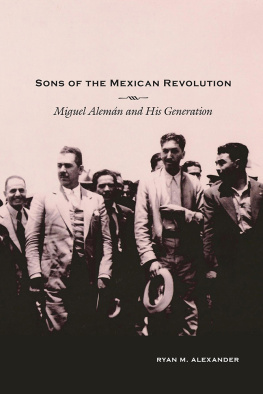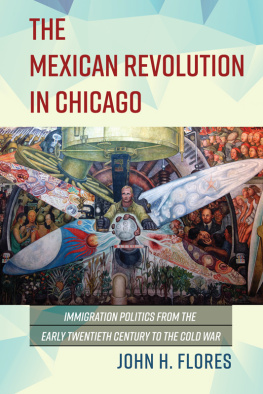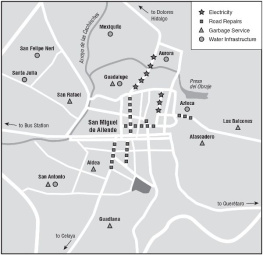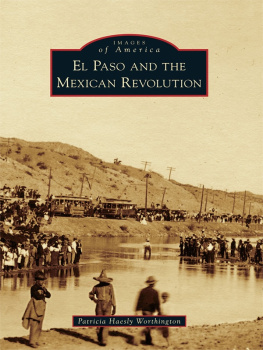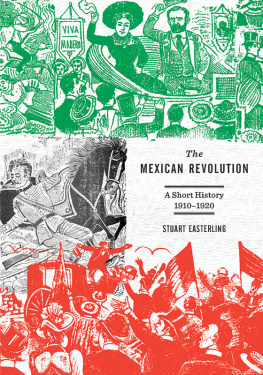Sons of the Mexican Revolution
Dilogos Series
KRIS LANE, SERIES EDITOR
Understanding Latin America demands dialogue, deep exploration, and frank discussion of key topics. Founded by Lyman L. Johnson in 1992 and edited since 2013 by Kris Lane, the Dilogos Series focuses on innovative scholarship in Latin American history and related fields. The series, the most successful of its type, includes specialist works accessible to a wide readership and a variety of thematic titles, all ideally suited for classroom adoption by university and college teachers.
Also available in the Dilogos Series:
The Pursuit of Ruins: Archaeology, History, and the Making of Modern Mexico by Christina Bueno
Gendered Crossings: Women and Migration in the Spanish Empire by Allyson M. Poska
From Shipmates to Soldiers: Emerging Black Identities in the Ro de la Plata by Alex Borucki
Women Drug Traffickers: Mules, Bosses, and Organized Crime by Elaine Carey
Searching for Madre Matiana: Prophecy and Popular Culture in Modern Mexico by Edward Wright-Rios
Africans into Creoles: Slavery, Ethnicity, and Identity in Colonial Costa Rica by Russell Lohse
Native Brazil: Beyond the Convert and the Cannibal, 15001900 edited by Hal Langfur
Emotions and Daily Life in Colonial Mexico edited by Javier Villa-Flores and Sonya Lipsett-Rivera
The Course of Andean History by Peter V. N. Henderson
Masculinity and Sexuality in Modern Mexico edited by Anne Rubenstein and Vctor M. Macas-Gonzlez
For additional titles in the Dilogos Series, please visit unmpress.com .
Sons of the Mexican Revolution
Miguel Alemn and His Generation
Ryan M. Alexander
2016 by the University of New Mexico Press
All rights reserved. Published 2016
Printed in the United States of America
21 20 19 18 17 161 2 3 4 5 6
Library of Congress Cataloging-in-Publication Data
Names: Alexander, Ryan M., 1982 author.
Title: Sons of the Mexican Revolution : Miguel Alemn and his generation / Ryan M. Alexander.
Description: Albuquerque : University of New Mexico Press, 2016. | Series: Dilogos Series | Includes bibliographical references and index.
Identifiers: LCCN 2015049832 | ISBN 9780826357380 (cloth : alk. paper) | ISBN 9780826357397 (pbk. : alk. paper) | ISBN 9780826357403 (electronic)
Subjects: LCSH: Alemn, Miguel, 19051983. | PresidentsMexicoBiography. | MexicoPolitics and government19461970. | MexicoPolitics and government19101946.
Classification: LCC F1235.5.A44 A79 2016 | DDC 972.08/27092dc23
LC record available at http://lccn.loc.gov/2015049832
Cover photograph courtesy of
Biblioteca Mexicana de la Fundacin Miguel Aleman, AC
Preface and Acknowledgments
At its broadest extent, this is a book about what happened to Mexicos explosive 1910 revolution, the first in a series of major revolutionary upheavals to occur in the twentieth century. The movement brought a welter of social reforms in the 1920s and 1930s, but ultimately its most conservative elements prevailed, leaving the nation with an authoritarian political system and an economy defined by severe inequality. By the 1940s official commitment to the revolutions most radical initiativesamong them the redistribution of rural land and the renovation of national culturehad withered away, terminating the movement before its greatest promises could be realized. Why was this the case?
This seemingly straightforward question invites a series of related questions relevant to all revolutionary processes. Were the individuals charged with converting the goals of revolutionaries into concrete policies inferior to the task? Did they become corrupted in their pursuit of power? Did the circumstances of context change too drastically, draining the movement of relevance and energy? Was the revolution, since it was rooted in the realities of one moment, simply unable to survive the passage of time? Were the old patterns of oligarchic rule more resilient than the revolutionaries had anticipated? Did the shift from one generation to another bring with it such new ideas that the movement became obsolete?
There is no single answer to all these questions. As with any movement this large and complex, there were multiple reasons that the Mexican revolution ended in incomplete form. Nevertheless, part of the explanation can be found in the generational shift that took place at the highest levels of government in the second half of the 1940s. Taking this change in ruling generation as its subject, this study examines a transformative moment at both the national and global scale, as Mexico simultaneously retreated from its revolutionary orientation and adjusted to the new geopolitical and economic realities of the early Cold War years. The responsibility for leading the nation through this watershed period fell to a generation of cosmopolitan civilians led by the son of a fallen revolutionary general. In my effort to understand the motives of the individuals who made up this generation, I have incurred many personal debts, and I would like to acknowledge as many of them as possible here.
Like many scholars, I consider the publication of my first book manuscript to be a major career milestone. On the long road to reaching that milestone, I have had the good fortune of sharing countless memorable experiences with wonderful people. This book represents that formative journey distilled into a relatively compact product. At the University of Arizona, I thrived under the guidance of Bill Beezley, who taught me how to operate in this profession. A number of other professorsKevin Gosner, Martha Few, Jadwiga Pieper-Mooney, Katherine Morrissey, Richard Eaton, and above all Bert Barickmaninfluenced how I think as a historian. What made Arizona a truly great program was the community of fellow graduate students who shared in both the triumphs and the frustrations of academic life. Although there are too many to list here, Amanda Lpez, Karin Friederic, Tracy Goode, Cory Schott, Tyler Ralston, Amie Kiddle, Steve Neufeld, Rob Scott, Michael Matthews, Erika Korowin, Kathryn Gallien, Adam Schwartz, and Lisa Munro stand out. Not only were they stimulating colleagues, but they were, and remain, lifelong friends.
Beyond Tucson, the list of people to whom I owe a debt of gratitude is long. Rod Camp was generous in sharing research materials, and Steve Lewis was kind to read prior drafts and offer his critiques of them. At the Truman Presidential Library, Randy Sowell was helpful and knowledgeable, making my short time there enormously productive. I appreciate the funding the library provided as well. In Mexico, Alejandro de Antuano Maurer, along with Pati Rojas and Susi Gallegos, made archival research a pleasant daily occurrence, often for months on end. I offer my sincere thanks to Miguel Alemn Velasco, along with Lorenzo Lazo and Antonio Carrillo Castro, for lending me their time and support of the project.






